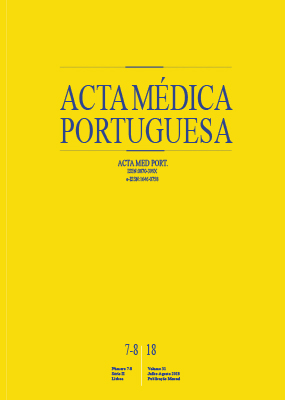Quality Indicators in Ambulatory Surgery: A Literature Review Comparing Portuguese and International Systems
DOI:
https://doi.org/10.20344/amp.10416Keywords:
Ambulatory Surgical Procedures, Outcome Assessment (Health Care), Portugal, Quality of Health Care, Quality Indicators, Health CareAbstract
Introduction: According to several studies conducted in North America and Europe, ambulatory surgery is a practice that has grown over the years, and both the number of more complex surgical procedures deemed suitable for ambulatory surgery and the number of patients with different co-morbidities which are now suitable for this type of procedure have been increasing. In order to respond to the increased number of day surgeries, as well as to avoid a potential proportional increase in perioperative morbidity, quality control systems must be adopted to enable continuous improvement and minimise predicted risks. The purpose of this study is to review global quality indicators used in ambulatory surgery and compare them with those used in Portugal.
Material and Methods: The authors conducted a comprehensive search of medical databases, using MeSH words. Limits were applied to include only studies published after 1998 written in Portuguese, English and Spanish. Ambulatory surgery indicators for Portugal were also obtained.
Results: Twenty-one different quality indicators for ambulatory surgery were identified. The Portuguese Healthcare Regulation Authority has defined seven quality indicators for ambulatory surgery.
Discussion: The Portuguese quality indicators for ambulatory surgery are generally well adapted to current international practices. Nevertheless, after analysing the relevant international literature based on this study, it is important to consider two additional indicators for ambulatory surgery – same day surgery cancellations and patient satisfaction.
Conclusion: On the literature review, same day surgery cancellations and patient satisfaction should be included in the National Health Assessment System created by the Portuguese Healthcare Regulation Authority.
Downloads
Downloads
Published
How to Cite
Issue
Section
License
All the articles published in the AMP are open access and comply with the requirements of funding agencies or academic institutions. The AMP is governed by the terms of the Creative Commons ‘Attribution – Non-Commercial Use - (CC-BY-NC)’ license, regarding the use by third parties.
It is the author’s responsibility to obtain approval for the reproduction of figures, tables, etc. from other publications.
Upon acceptance of an article for publication, the authors will be asked to complete the ICMJE “Copyright Liability and Copyright Sharing Statement “(http://www.actamedicaportuguesa.com/info/AMP-NormasPublicacao.pdf) and the “Declaration of Potential Conflicts of Interest” (http:// www.icmje.org/conflicts-of-interest). An e-mail will be sent to the corresponding author to acknowledge receipt of the manuscript.
After publication, the authors are authorised to make their articles available in repositories of their institutions of origin, as long as they always mention where they were published and according to the Creative Commons license.









